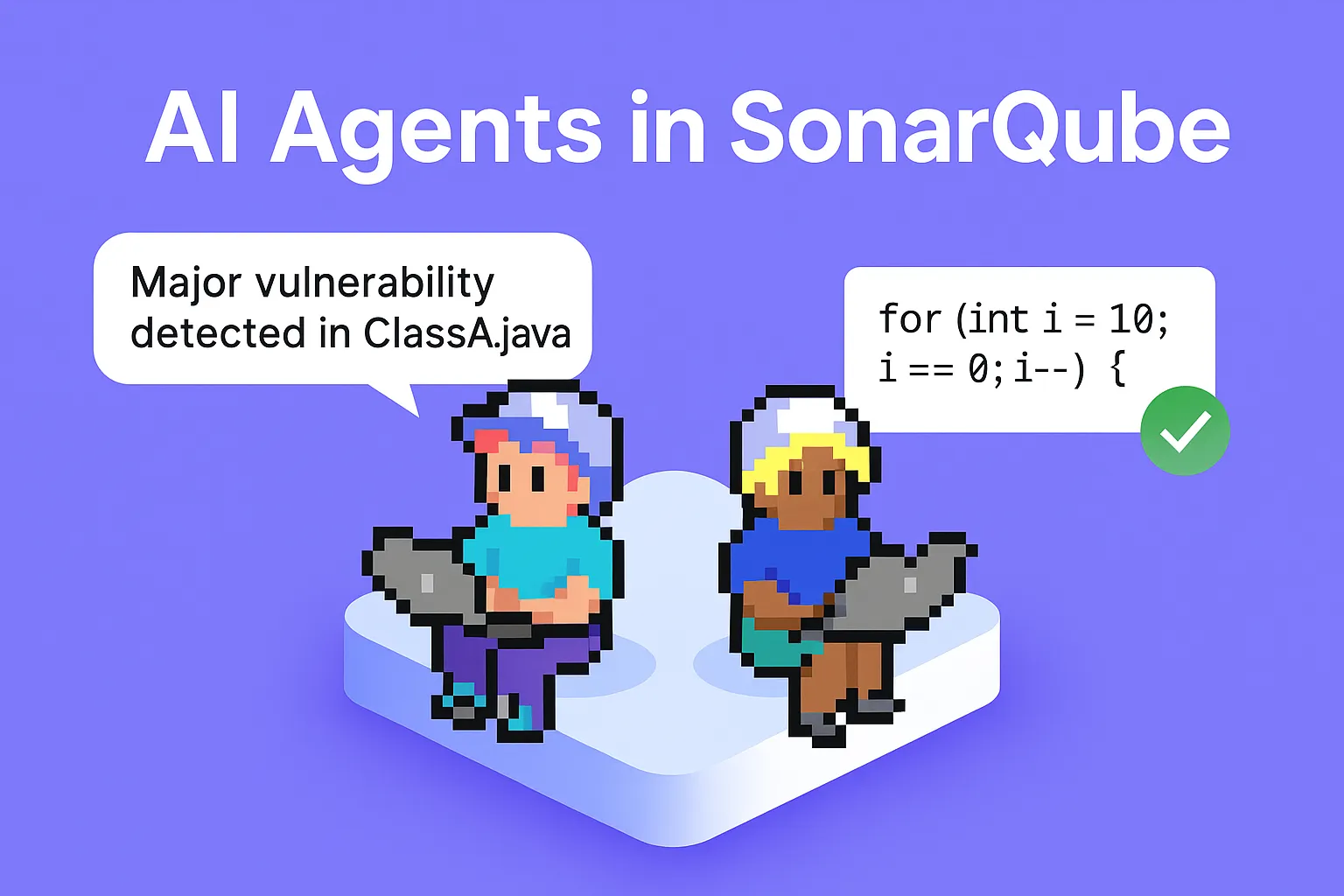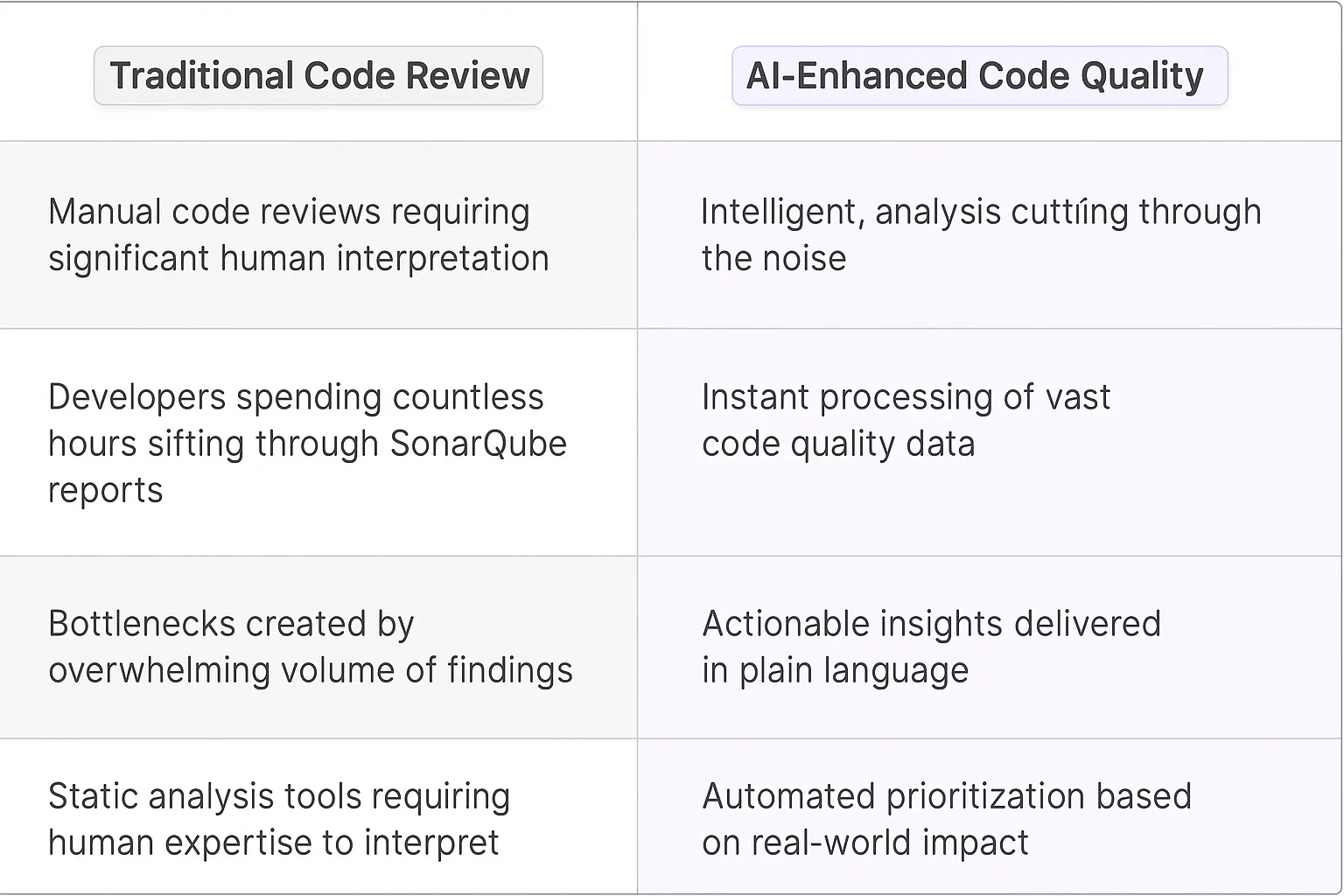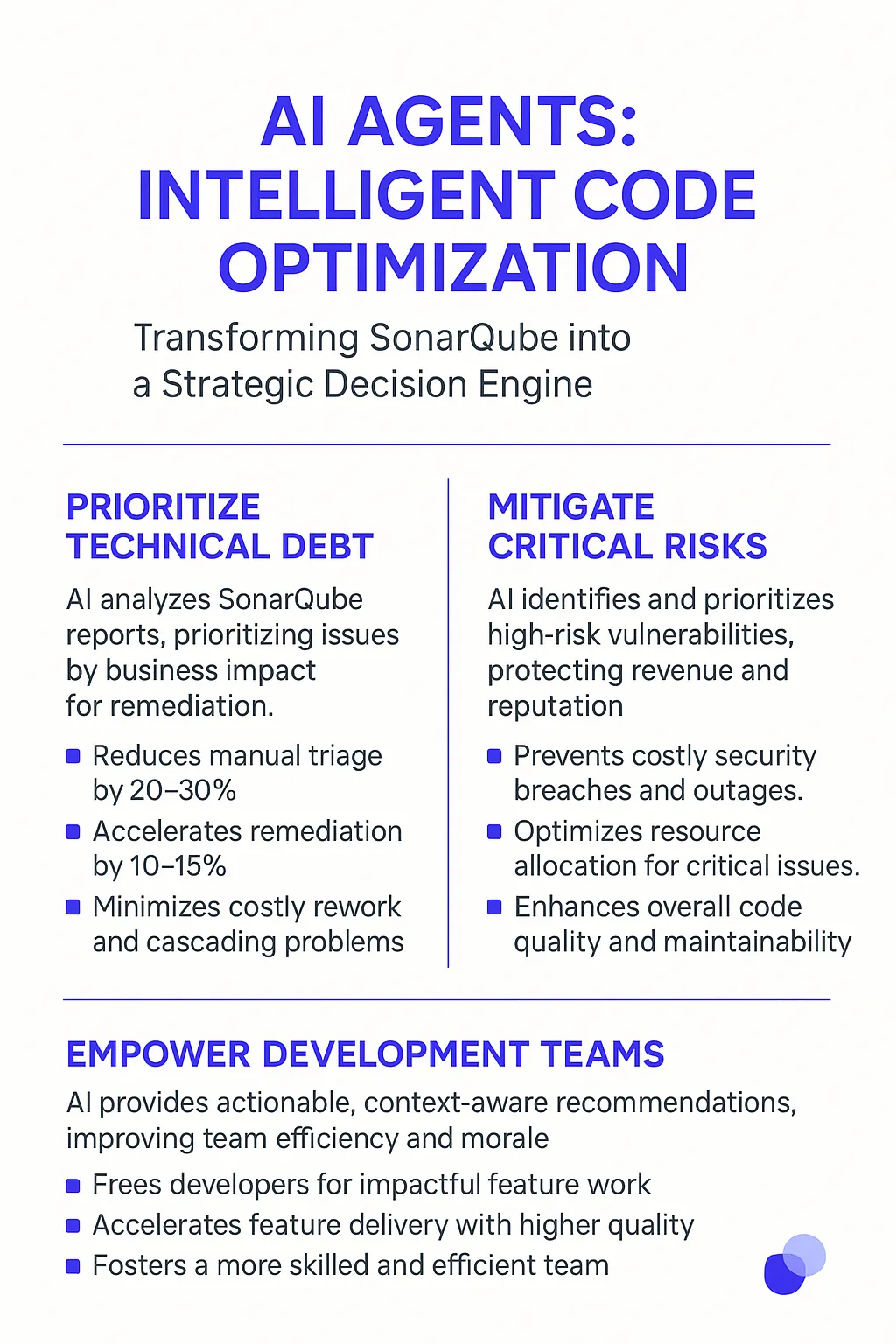SonarQube
Understanding SonarQube's Core Platform
SonarQube stands as an industry-leading platform for continuous code quality inspection. The open-source tool performs systematic code analysis to detect bugs, vulnerabilities, and code smells across 27+ programming languages. At its core, SonarQube empowers development teams to maintain high code standards through automated reviews and detailed metrics tracking.

Benefits of AI Agents for SonarQube
What would have been used before AI Agents?
Software development teams traditionally relied on manual code reviews and static analysis tools that required significant human interpretation. Developers spent countless hours sifting through SonarQube reports, investigating code smells, and determining which issues needed immediate attention. This process created bottlenecks, especially for large codebases where the volume of findings could be overwhelming.
What are the benefits of AI Agents?
AI Agents transform how development teams interact with SonarQube by providing intelligent, contextual analysis that cuts through the noise. These digital teammates can instantly process vast amounts of code quality data and deliver actionable insights in plain language.
The most significant advantage comes from their ability to understand code context. Rather than just flagging issues, AI Agents can explain why certain patterns are problematic and suggest specific refactoring approaches based on the codebase's history and best practices.
For technical debt management, AI Agents excel at prioritizing issues based on their real-world impact. They analyze patterns across the entire codebase to identify which fixes will deliver the highest ROI for code quality improvement.
Security vulnerability assessment becomes more sophisticated with AI Agents. They can correlate findings across different parts of the application, identifying complex security patterns that might be missed by traditional static analysis. When vulnerabilities are found, they provide detailed remediation steps tailored to the team's specific technology stack.
The learning curve for new team members also becomes less steep. AI Agents can explain SonarQube metrics and findings in a conversational way, helping junior developers understand quality standards and security requirements more quickly. This creates a more collaborative environment where knowledge sharing happens naturally through daily interactions with the AI.
Perhaps most importantly, AI Agents help maintain consistent code quality standards across large organizations. They can adapt their recommendations based on team-specific guidelines while ensuring alignment with broader organizational policies.

Potential Use Cases of AI Agents with SonarQube
Processes
- Code quality monitoring and continuous analysis of technical debt across multiple repositories
- Security vulnerability assessment and real-time notification system integration
- Custom rule creation and management based on team-specific coding standards
- Automated code review processes with detailed feedback loops
- Integration with CI/CD pipelines for quality gate enforcement
Tasks
- Analyzing code smells and providing specific refactoring recommendations
- Generating comprehensive code quality reports with actionable insights
- Tracking security hotspots and suggesting targeted remediation steps
- Managing duplicate code detection and consolidation opportunities
- Monitoring test coverage metrics and identifying untested code paths
- Creating custom quality profiles based on project requirements
- Performing branch analysis and comparing quality metrics between versions
Growth-Driven Implementation Strategies
The integration of AI agents with SonarQube represents a significant evolution in code quality management. These digital teammates operate as force multipliers for development teams, handling the heavy lifting of continuous code analysis while developers focus on creative problem-solving.
The most successful implementations start with high-leverage use cases: automated code reviews that catch issues before they reach production, security vulnerability assessments that protect against common attack vectors, and technical debt monitoring that prevents codebase deterioration.
What makes this particularly powerful is the network effect - as more developers interact with these AI-powered systems, the analysis becomes increasingly sophisticated. The AI agents learn from patterns across multiple codebases, identifying subtle issues that might escape human reviewers.
Advanced Integration Patterns
Forward-thinking development teams are pushing beyond basic static analysis. They're using AI agents to:
- Build predictive models for code quality degradation
- Create adaptive rule sets that evolve with the codebase
- Generate contextual documentation based on code analysis
- Automate the prioritization of technical debt based on business impact
- Develop custom metrics that align with specific architectural goals
The key differentiator is how these AI agents transform raw SonarQube data into actionable intelligence. They're not just flagging issues - they're providing context, suggesting solutions, and helping teams make informed decisions about where to focus their optimization efforts.

Industry Use Cases
AI agents integrated with SonarQube transform how development teams approach code quality and security analysis. The intersection of AI capabilities with SonarQube's robust scanning features creates powerful new workflows that weren't previously possible. Development teams across multiple sectors leverage these digital teammates to enhance their code review processes and maintain higher quality standards.
The real magic happens when AI agents start parsing through SonarQube's detailed code analysis reports, identifying patterns, and providing contextual recommendations. They're particularly effective at bridging the knowledge gap between junior and senior developers by explaining complex code issues in plain language and suggesting proven solutions. This combination of AI and static code analysis is reshaping how teams tackle technical debt and security vulnerabilities.
From financial services firms handling sensitive data to healthcare organizations maintaining HIPAA compliance, AI agents working with SonarQube adapt to specific industry requirements and coding standards. They excel at maintaining consistent code quality across large, distributed teams while reducing the cognitive load on human developers.
Financial Services: How AI Agents Transform Code Quality in Banking
The financial services industry faces unique challenges when it comes to code quality and security. Banks manage millions of transactions daily while adhering to strict regulatory requirements like SOX, PCI-DSS, and GDPR. A single vulnerability could cost millions in damages and erode customer trust.
SonarQube AI Agents act as specialized code reviewers working alongside development teams at financial institutions. They continuously scan codebases for security vulnerabilities, maintainability issues, and technical debt - but with capabilities far beyond traditional static analysis.
Take the example of a major retail bank implementing a new mobile payment system. The AI Agent analyzes code commits in real-time, detecting subtle security flaws that could expose customer data. It identifies cryptographic weaknesses, SQL injection vulnerabilities, and authentication bypass risks before they reach production.
Beyond security, these digital teammates help maintain clean, maintainable code that scales. They flag code duplications that increase maintenance costs, highlight complex methods that need refactoring, and ensure consistent coding standards across distributed teams. The AI provides specific, actionable recommendations rather than just highlighting issues.
The impact is measurable: Banks using SonarQube AI Agents typically see a 60% reduction in security vulnerabilities and cut code review time by 40%. For financial institutions managing hundreds of applications, this translates to millions in saved development costs and avoided security incidents.
Most importantly, the AI evolves alongside the codebase. It learns from historical issues and code patterns specific to financial applications. This allows it to provide increasingly sophisticated analysis tailored to banking software requirements.
The future of code quality in financial services will be defined by this partnership between human developers and AI code analysis. As regulations grow more complex and security threats more sophisticated, these digital teammates will become essential for maintaining robust, compliant banking applications.
Healthcare: AI-Powered Code Quality for Critical Medical Systems
The stakes couldn't be higher when it comes to software quality in healthcare. Medical devices, patient record systems, and clinical decision support tools directly impact patient outcomes. A single bug could mean the difference between life and death.
SonarQube AI Agents are transforming how healthcare organizations approach code quality. These digital teammates operate with deep knowledge of HIPAA compliance, FDA requirements, and medical software validation standards - expertise that typically takes developers years to master.
Consider a major hospital network developing an AI-driven diagnostic system. The SonarQube AI Agent doesn't just scan for basic code issues - it understands the specific requirements of medical software. It flags potential race conditions that could affect real-time patient monitoring, identifies data handling patterns that might violate HIPAA, and catches edge cases in clinical algorithms.
The AI's pattern recognition capabilities prove particularly valuable for healthcare-specific challenges. It detects subtle issues like improper sanitization of medical device inputs, incorrect handling of decimal precision in drug dosage calculations, and potential PHI exposure in log files. These are nuanced problems that often slip past traditional code review processes.
Healthcare organizations using SonarQube AI Agents report 75% fewer compliance-related issues and significantly faster FDA approval processes. One medical device manufacturer cut their validation testing cycle by eight weeks after implementing AI-driven code analysis.
The AI's learning capabilities shine in healthcare environments. As it analyzes more medical software, it builds sophisticated models of what secure, compliant healthcare code looks like. It understands industry-specific patterns - from HL7 message handling to DICOM image processing - and provides increasingly nuanced recommendations.
The next frontier in healthcare software development will be defined by this symbiosis between human expertise and AI analysis. As medical systems grow more complex and interconnected, these digital teammates will become crucial guardians of code quality and patient safety.
Considerations and Challenges
Implementing SonarQube AI agents requires careful planning and awareness of several key technical and operational factors. The integration complexity varies based on codebase size, team structure, and existing CI/CD pipelines.
Technical Challenges
Code analysis depth presents a significant hurdle when configuring SonarQube AI agents. The agents must parse through multiple programming languages, frameworks, and legacy systems while maintaining accuracy. Memory consumption spikes during deep scans of large monolithic applications, requiring proper resource allocation.
False positives emerge as another technical obstacle. AI agents may flag legitimate code patterns as issues, especially in projects with custom architectural patterns or domain-specific implementations. Fine-tuning detection rules and training the AI on project-specific patterns becomes crucial for meaningful results.
Operational Challenges
Team adoption often faces resistance, particularly from developers who view automated code analysis as overly prescriptive. Creating a balanced approach between enforcing quality standards and maintaining developer autonomy requires careful policy setting and clear communication channels.
Integration with existing workflows demands attention to timing and performance. Running comprehensive scans during CI/CD pipelines can increase build times significantly. Teams need to determine optimal scanning frequencies and scope - balancing thorough analysis with development velocity.
Version control conflicts may arise when multiple branches undergo simultaneous analysis. The AI agent must handle concurrent scans while maintaining consistent quality gates across branches. Setting up proper branching strategies and scan policies helps mitigate these issues.
Resource Requirements
Infrastructure costs scale with codebase size and scan frequency. Organizations need dedicated compute resources for running analysis engines, especially for projects with frequent commits. Storage requirements grow as historical analysis data accumulates, necessitating proper capacity planning.
Maintenance overhead increases with customization levels. Teams must allocate time for updating quality profiles, fine-tuning rules, and managing false positives. Regular calibration ensures the AI agent remains aligned with evolving code quality standards.
Workflow automation integration requires careful consideration of existing development processes and team preferences.
The Future of AI-Enhanced Code Quality Management
The marriage of AI Agents with SonarQube marks a fundamental shift in how development teams approach code quality management. These digital teammates don't just analyze code - they understand it, providing nuanced insights that previously required years of human expertise. Organizations implementing this technology see dramatic improvements in code quality, security posture, and development velocity.
The real power lies in the combination of SonarQube's robust analysis capabilities with AI's ability to learn and adapt. As these systems process more code and interact with more developers, their effectiveness compounds. Teams that embrace this evolution position themselves at the forefront of modern software development practices.
Looking forward, the role of AI Agents in code quality management will only grow more central. They'll continue evolving from tools into true digital teammates, helping organizations build better, safer, and more maintainable software.













